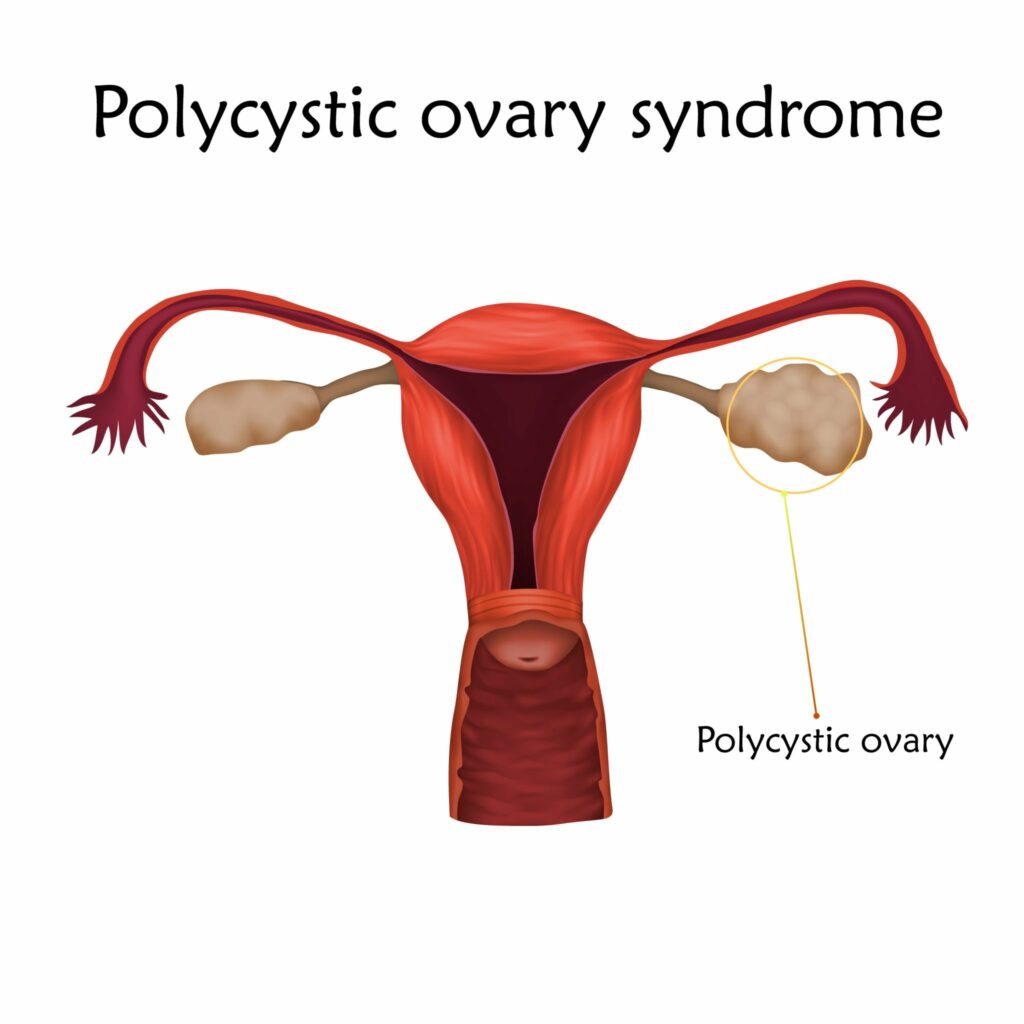
Polycystic Ovary Syndrome (PCOS)
By Team on 20 Dec, 2023
Polycystic Ovary Syndrome (PCOS) is a common endocrine disorder that affects females. One of the significant challenges with PCOS is its impact on fertility. While PCOS itself doesn’t directly cause infertility, it can contribute to difficulties in conceiving due to disruptions in the normal hormones and reproductive processes.
PCOS and its Causes:

Insulin resistance is a common feature of PCOS. When cells become less responsive to insulin, the pancreas produces more insulin to compensate. Elevation in insulin levels can stimulate the ovaries to produce more androgens. Increased androgen levels can disrupt the normal development of ovarian follicles and inhibit the release of eggs during ovulation. In a normal menstrual cycle, the ovaries release an egg during ovulation. In PCOS, the irregular hormonal environment can prevent the regular release of eggs, leading to ovulatory dysfunction. Without ovulation or with irregular ovulation, the chances of conceiving naturally are reduced. PCOS is often associated with obesity, and excess weight can exacerbate insulin resistance and hormonal imbalances, further complicating fertility. Inflammation and other metabolic disturbances linked to PCOS may also contribute to fertility challenges. The exact cause of PCOS is not fully known, but a combination of genetic and environmental factors is believed to play a role.
Symptoms
PCOS symptoms include irregular periods, fertility issues, excess hair growth, acne, and baldness. Ultrasound may show cysts on the ovaries. Insulin resistance leads to weight gain, especially in the belly, and trouble losing weight. Skin changes, mood swings, fatigue, and occasional pelvic pain can also occur. Symptoms vary, and not everyone with PCOS has the same signs. Early diagnosis and professional management are essential for addressing symptoms and potential problems.
PCOS symptoms include irregular periods, fertility issues, excess hair growth, acne, and baldness. Ultrasound may show cysts on the ovaries. Insulin resistance leads to weight gain, especially in the belly, and trouble losing weight. Skin changes, mood swings, fatigue, and occasional pelvic pain can also occur. Symptoms vary, and not everyone with PCOS has the same signs. Early diagnosis and professional management are essential for addressing symptoms and potential problems.
Impact of PCOS on Fertility:
The fertility challenges with PCOS are primarily related to difficulties in achieving regular ovulation. Ovulatory dysfunction can result in menstrual irregularities, prolonged menstrual cycles, or even amenorrhea (absence of menstruation). Irregular menstrual cycles can make it challenging to predict the fertility for conception. Without regular ovulation, the chances of a viable egg being available for fertilization are reduced.
Anovulation or irregular ovulation reduces the frequency of egg release. This directly impacts the probability of conception, as fertilization is contingent on the presence of a mature egg. Women with PCOS may have a higher risk of early pregnancy loss or miscarriage. The exact reasons for this are not fully understood but may be because of hormonal imbalances and irregularities in the development of the uterine lining.
The fertility challenges with PCOS are primarily related to difficulties in achieving regular ovulation. Ovulatory dysfunction can result in menstrual irregularities, prolonged menstrual cycles, or even amenorrhea (absence of menstruation). Irregular menstrual cycles can make it challenging to predict the fertility for conception. Without regular ovulation, the chances of a viable egg being available for fertilization are reduced.
Anovulation or irregular ovulation reduces the frequency of egg release. This directly impacts the probability of conception, as fertilization is contingent on the presence of a mature egg. Women with PCOS may have a higher risk of early pregnancy loss or miscarriage. The exact reasons for this are not fully understood but may be because of hormonal imbalances and irregularities in the development of the uterine lining.
Treatment for PCOS-Related Infertility:

The fertility treatments and lifestyle interventions can be effective in overcoming the challenges posed by PCOS. The choice of treatment depends on individual circumstances, including the severity of symptoms and the specific fertility issues faced by the individual.
- Weight management is a key component of addressing PCOS-related fertility issues, particularly in cases where obesity is a contributing factor. Regular physical activity and a balanced diet can help improve insulin sensitivity and regulate hormonal imbalances.
- For individuals with PCOS who have difficulty ovulating, medications such as clomiphene citrate or letrozole may be prescribed. These drugs stimulate the ovaries to release eggs.
- IUI involves placing sperm directly into the uterus, bypassing potential cervical and vaginal barriers. This can be beneficial for individuals with PCOS who have ovulatory dysfunction.
- IVF is a more advanced assisted reproductive technology. It involves the retrieval of eggs from the ovaries, fertilizing them with sperm in a laboratory, and then transferring the embryos into the uterus. IVF can be a suitable option for individuals with PCOS who do not respond to other fertility treatments or have additional infertility factors.
- In some cases, surgical interventions such as ovarian drilling might be considered. This involves making small punctures in the ovaries using laser or heat to stimulate regular ovulation.
- Addressing other conditions commonly associated with PCOS, such as insulin resistance and high androgen levels, is crucial. Medications like metformin might be prescribed to improve insulin sensitivity.
Conclusion:
While PCOS can present challenges to fertility, it’s important to recognize that effective treatments are available. A personalized approach, considering the individual’s overall health, severity of PCOS symptoms, and fertility goals, is essential. With the right interventions, many individuals with PCOS can achieve successful pregnancies and fulfil their dreams of starting a family




